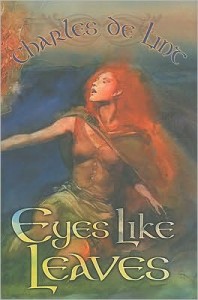 It all begins with a dream, a long-awaited summoning that calls the tree-wizard Tarn into action after ages of quiet waiting. Compelled by the god known as Hafarl the Summerlord to seek out those with the Summerlord’s blood in their veins, Tarn begins an epic journey. Joined by the untrained Summerborn Carrie and a number of other allies as their paths cross, Tarn struggles to fulfill his mission. Unfortunately, magic is dying in the Green Isles as the Icelord’s power spreads and his servants, the monstrous stormborn, sweep across the land. As they battle all manner of foul creatures, Carrie and Tarn also learn more about their own powers and heritage, and how they’re connected to a war between the gods themselves. And what role does the mysterious Puretongue, Tarn’s mentor and one of the greatest tree-wizards ever to live, have to play in this story? The balance of nature and the very future of the Green Isles hangs in the balance. What sacrifices will be made to save the day?
It all begins with a dream, a long-awaited summoning that calls the tree-wizard Tarn into action after ages of quiet waiting. Compelled by the god known as Hafarl the Summerlord to seek out those with the Summerlord’s blood in their veins, Tarn begins an epic journey. Joined by the untrained Summerborn Carrie and a number of other allies as their paths cross, Tarn struggles to fulfill his mission. Unfortunately, magic is dying in the Green Isles as the Icelord’s power spreads and his servants, the monstrous stormborn, sweep across the land. As they battle all manner of foul creatures, Carrie and Tarn also learn more about their own powers and heritage, and how they’re connected to a war between the gods themselves. And what role does the mysterious Puretongue, Tarn’s mentor and one of the greatest tree-wizards ever to live, have to play in this story? The balance of nature and the very future of the Green Isles hangs in the balance. What sacrifices will be made to save the day?
Eyes Like Leaves is very much a historical artifact, a “lost novel” from the earliest days of de Lint’s career. Written in 1980, his fourth novel, it was slated to come out at a time when de lint stood at a crossroads: publish this book and forever be marked as a “secondary world” fantasy author, or go with Yarrow and solidify his role as a “contemporary” fantasy author (what we tend to call urban fantasy today). As the bookshelves will show, Charles de Lint decided that his heart and talents lay in the modern world, and he’s pretty much been known as an urban fantasy author (one of the first and best of the genre as we know it). We’ve been richer for it ever since. With the recent interest in his older works, as collected in previous Subterranean volumes, he decided that now was as good a time as any to unearth this long-lost work and let it see the light of day. But have the better part of thirty years been kind to this particular book? I’m not so sure.
Let me say right out that as a fantasy novel goes, Eyes Like Leaves is pretty good. As a de Lint novel, however, it’s … not his best. It’s very pretty, well-written with gorgeous imagery and an eye for detail that has always been one of his hallmarks. You can practically hear the music running through the storyline, and very few people do Celtic-inspired, Tolkienesque high fantasy quite as well as Charles de Lint. It’s very much a product of its time, as the author himself admits in the preface, hewing to the standards and attitudes of the time where fantasy was concerned. But what was typical back then comes off as dated and quaint when compared to the progress, changes, and evolution in the field in the thirty years since. This is definitely old-school quest fantasy, with characters who go from Point A to Point B in order to facilitate an climatic battle between Good and Evil.
Unfortunately, not only does it suffer for being a time-lost representative of a previous generation of fantasy, it suffers from being one of de Lint’s earliest books. It lacks the complex interpersonal relations and complex emotional depths of his Newford novels, and the characters don’t have that certain spark that brings Jilly Coppercorn or Christy Riddell (to name two) to life. The resonance just isn’t there, for all that they move through beautiful scenery and fight deadly monsters in harrowing combat.
I’ve long been a fan of Charles de Lint; his Newford stories rank among my favorites, and I’ve always held him up as one of the great urban fantasy writers, for all that the field has been overrun by badass women in leather pants and wisecracking private detectives. His ability to infuse the modern world with quiet magic, artistic sensibilities and genuine emotion has always made his works a joy to read. However, Eyes Like Leaves hails from a time when he was still honing his craft, like a journeyman on the road to becoming a master (or grand master). While it’s bound to appeal to completionists and diehard fans, it’s hard to get excited about this book otherwise. Take it for what it is: a long-lost curiosity standing out as an example of what fantasy was like once upon a time. There’s plenty to love here, but I’m thankful de Lint choose the path he did nonetheless.
